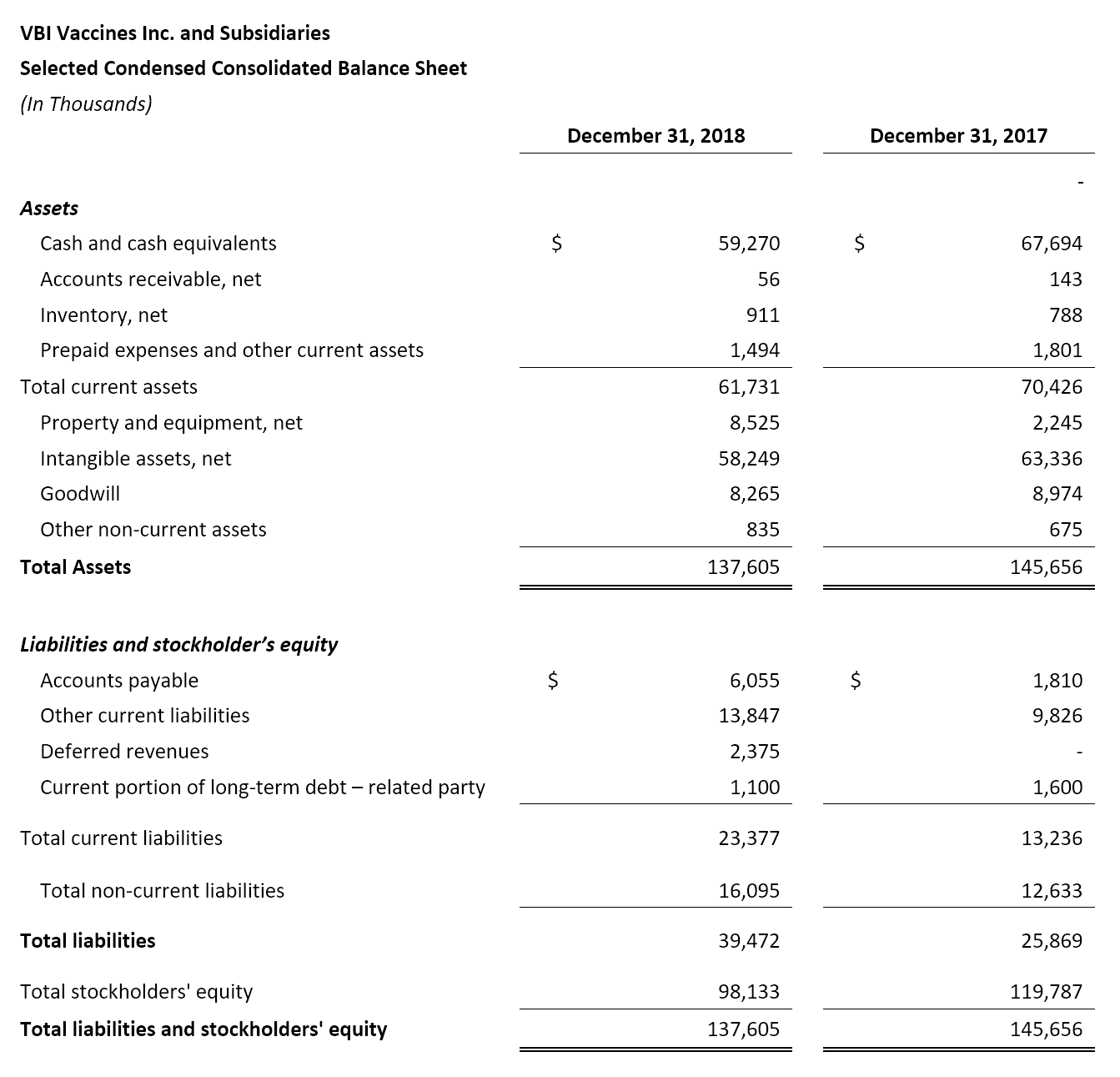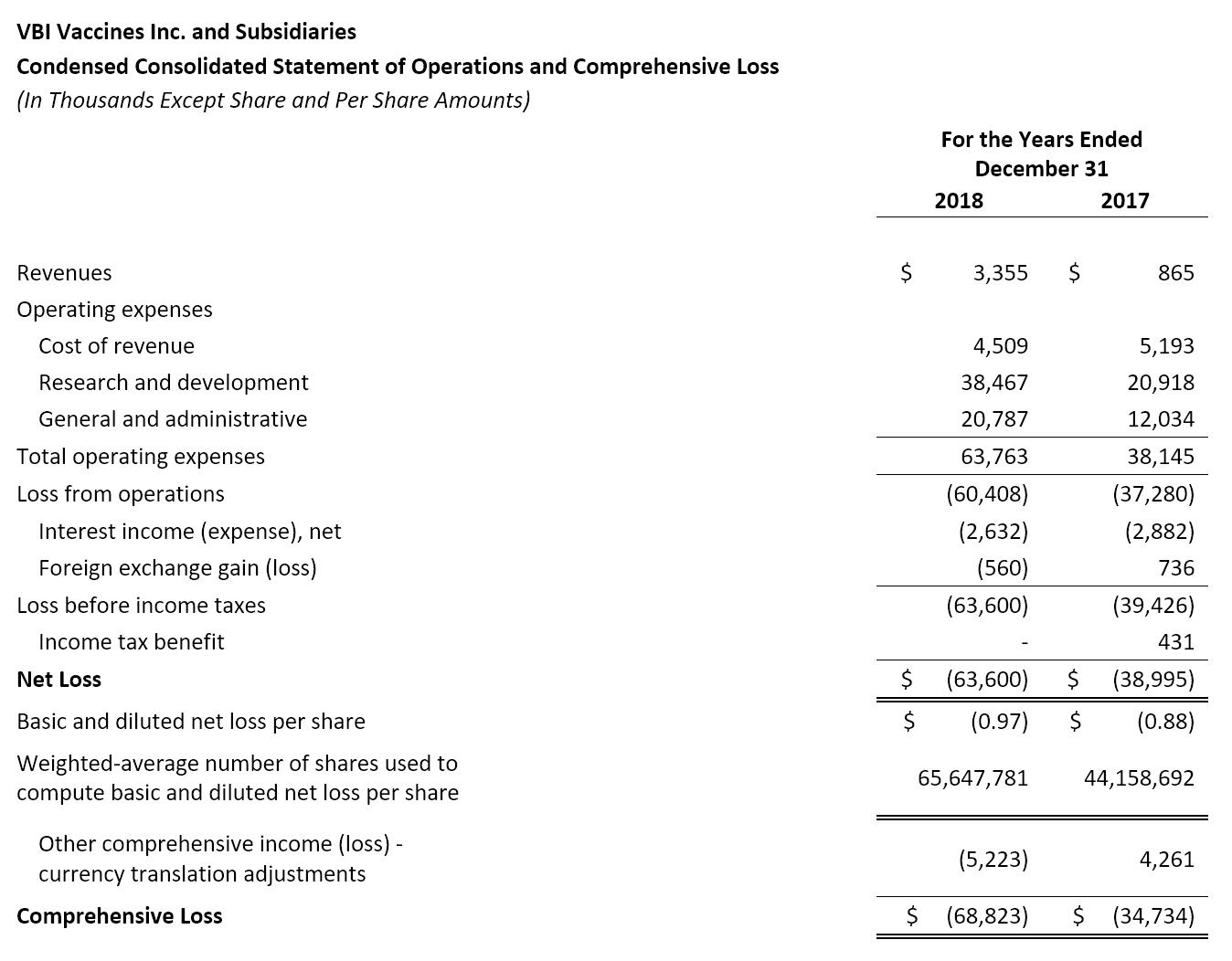- Top-line data from Hepatitis B (Sci-B-Vac®) Phase 3 PROTECT trial expected mid-year 2019
- Encouraging early immunogenicity data from GBM Phase 1/2a supports advancing into Part B of the study
- License and Collaboration with Brii Biosciences, to develop a functional cure for Hepatitis B, expected to initiate clinical proof of concept studies by the end of 2019
VBI Vaccines Inc. (NASDAQ: VBIV) (“VBI”), a commercial-stage biopharmaceutical company developing next-generation infectious disease and immuno-oncology vaccines, today provided a corporate update, outlook for 2019, and announced its financial results for the fourth quarter and twelve months ended December 31, 2018.
“2018 was a foundational year, one that laid critical groundwork as we build towards the transformational milestones expected in 2019,” said Jeff Baxter, President and CEO, VBI Vaccines Inc. “Our achievements in 2018 – which included the launch of the collaboration with Brii Biosciences to develop a functional cure for Hepatitis B for up to $129 million plus royalties, the closing of a $42.9 million public offering led by Perceptive Advisors, the positive Phase 1 data readout from our cytomegalovirus (CMV) vaccine candidate, and encouraging early immunogenicity data from the Phase 1/2a of our glioblastoma (GBM) immuno-therapeutic – set the stage for 2019. Heading into this year, VBI is well-positioned to achieve meaningful clinical milestones across all of our lead programs, most notably the top-line data readout from the PROTECT Phase 3 study of Sci-B-Vac® expected in four months’ time.”
Sci-B-Vac® Program Update (Prophylactic Hepatitis B)
In December 2017, the Company initiated enrollment in two pivotal Phase 3 clinical studies – PROTECT and CONSTANT – in a total of approximately 4,500 adults. The studies were designed to assess safety and efficacy of Sci-B-Vac®, VBI’s prophylactic hepatitis B (HBV) vaccine that is the only commercially-available trivalent HBV vaccines containing Pre-S1, Pre-S2, and S antigens and adjuvanted with alum.
“Hepatitis B remains a serious public health unmet need, one where enhanced protection through vaccination is vital for long-term control,” said Francisco Diaz-Mitoma, M.D., Ph.D., VBI’s Chief Medical Officer. “In the last two decades, Sci-B-Vac® has been tested in 22 different clinical trials and has been safely and effectively administered to over 500,000 infants and adults in the commercial setting. We believe the extensive safety and efficacy data we have to-date has largely de-risked the ongoing Phase 3 studies. We look forward to the data readouts later this year, as we work to provide a rapid, potent, and safe hepatitis B vaccine to address this significant unmet infectious disease need.”
Upcoming Sci-B-Vac® Clinical Data Read-outs
- Mid-year 2019: PROTECT Phase 3 top-line data
- PROTECT is a head-to-head immunogenicity study in approximately 1,600 subjects comparing Sci-B-Vac® to Engerix-B®.
- Primary endpoints include non-inferiority of Sci-B-Vac® in adults over age 18, and superiority of Sci-B-Vac® in adults over age 45.
- Secondary endpoints include non-inferiority of Sci-B-Vac® after two vaccinations compared with three vaccinations of Engerix-B®, and safety.
- Around year-end 2019: CONSTANT Phase 3 top-line data
- CONSTANT is a lot-to-lot consistency study in approximately 2,850 subjects comparing immune responses across three independent, consecutively manufactured lots of Sci-B-Vac®.
- Secondary endpoints include safety, and efficacy compared with Engerix-B®
Other Pipeline Program Updates
GBM Immuno-therapeutic
VBI-1901, an immuno-therapy developed using VBI’s proprietary enveloped virus-like particle (eVLP) technology platform, is being assessed in an ongoing phase 1/2a clinical study in recurrent GBM patients. In 2018, VBI completed enrollment in all three dose cohorts in the Part A dose-escalation phase of the study, with six patients enrolled in each cohort. In February 2019, the independent Data and Safety Monitoring Board (DSMB) reviewed all safety data from Part A and unanimously recommended the continuation of the study without modification.
“While Part A of the study was primarily designed to assess safety and tolerability of VBI-1901 to support the identification of the optimal therapeutic dose level for Part B of the study, we are encouraged by the early immunogenicity data we’ve observed to-date,” said David Anderson, Ph.D., VBI’s Chief Scientific Officer. “Part B of the study will have narrower enrollment criteria and is primarily designed to assess efficacy signals of VBI-1901 in recurrent GBM patients. With a more homogenous patient cohort in Part B, we look forward to identifying potential initial correlations between immunologic responses and clinical outcomes by year-end 2019.”
Upon selection of the optimal dose level in Part A, based on safety and immunogenicity data, the Company expects to initiate enrollment of an additional 10 patients in the subsequent Part B extension phase of the study. Expanded immunologic data and 6-month survival data from all dose cohorts in the Part A dose-escalation phase are expected later in the first half of 2019.
Hepatitis B Immuno-therapeutic
In December 2018, VBI announced a license and collaboration agreement with Brii Biosciences, for up to $129 million plus royalties, for the development of a functional cure for the treatment of chronic hepatitis B infection using VBI-2601. VBI-2601 is a novel immuno-therapeutic candidate that is uniquely formulated to target B- and T-cell immunity by neutralizing circulation of the hepatitis B virus, blocking hepatitis B infection of hepatocytes through Pre-S1 immunity, and enabling immune-mediated clearance of HBV-infected hepatocytes.
As part of this collaboration, clinical proof of concept studies are expected to be initiated by the end of 2019.
CMV Prophylactic Vaccine
In May 2018, VBI announced positive top-line data from the Phase 1 study of VBI-1501, the Company’s prophylactic vaccine candidate for CMV. The Phase 1 top-line data showed that VBI-1501 was safe and well-tolerated at all doses and was immunogenic, even at the lower doses tested. In December 2018, VBI announced plans for a formal Phase 2 dose-ranging study to assess safety and immunogenicity of VBI-1501 at higher doses. The highest dose level is expected to be 10-times higher than that tested in the Phase 1 study.
The Company expects to initiate enrollment in the Phase 2 study by the end of 2019, following the requisite toxicology studies.
Financial Results for the Three and Twelve Months Ended December 2018
- VBI ended the fourth quarter of 2018 with $59.3 million cash and cash equivalents compared with $67.7 million as of December 31, 2017. Net cash used in operating activities for the full year 2018 was $45.5 million, compared to $31.4 million for the same period in 2017. Additionally, the purchase of property and equipment in 2018 was $6.0 million compared with $0.6 million in 2017. This increase was due to the modernization and capacity increase of the Rehovot site, where all clinical and commercial supplies of Sci-B-Vac® are manufactured, to enable the supply of commercial quantities of Sci-B-Vac® upon marketing authorization approval by the FDA, EMA, and/or Health Canada. As part of this modernization and capacity increase, the site was temporarily shut down as of April 22, 2018. The construction related to the modernization and capacity increase is ongoing, and validation activities are in progress.
- Revenue for the fourth quarter of 2018 was $2.7 million, and was primarily attributable to amounts recognized as part the therapeutic Hepatitis B license and collaboration agreement with Brii Biosciences. Revenue for the fourth quarter of 2017 was $0.2 million and was primarily attributable to sales of Sci-B-Vac® in Israel. Product sales in 2018 were $0.6 million compared with $0.5 million in 2017. The change was due to an increase in product sales related to the Sci-B-Vac® named-patient program in Europe, offset by a slight decrease in Sci-B-Vac® sales in Hong Kong and Israel.
- Cost of Revenue for the full year 2018 was $4.5 million compared with $5.2 million for the full year 2017. This decrease was due to the Rehovot site shut-down, resulting in limited production activity, reduced maintenance and utilities expenses, and allocation of some overhead to general and administrative expenses.
- Research and development expenses for the fourth quarter and full year 2018 were $10.1 million and $38.5 million, respectively. Research and development expenses for the same periods in 2017 were $6.5 million and $20.9 million, respectively. The increase was driven by the initiation and execution of the two Sci-B-Vac® Phase 3 trials and the GBM Phase 1/2a clinical trial, which are currently ongoing.
- General and administrative expenses for the fourth quarter and full year 2018 were $9.9 million and $20.8 million, respectively. General and administrative expenses for the same periods in 2017 were $3.4 million and $12.0 million, respectively. The increase was primarily attributable to a $6 million payment made in December 2018 to re-obtain a distribution agreement with a third party who previously held certain distribution rights to certain Asian markets.
- Net loss and net loss per share for the year-end 2018 were $63.6 million and $0.97, respectively, compared to a net loss of $39.0 million and a net loss per share of $0.88 for the year-end 2017.

 About VBI Vaccines Inc.
About VBI Vaccines Inc.
VBI Vaccines Inc. (Nasdaq: VBIV) is a commercial-stage biopharmaceutical company developing a next generation of vaccines to address unmet needs in infectious disease and immuno-oncology. VBI is advancing the prevention and treatment of hepatitis B, with the only commercially-approved trivalent hepatitis B vaccine, Sci-B-Vac®, which is approved for use in Israel and 10 other countries and is currently in a Phase 3 study in the U.S., Europe, and Canada, and with an immuno-therapeutic in development for a functional cure for chronic hepatitis B. VBI’s eVLP Platform technology allows for the development of enveloped virus-like particle (eVLP) vaccines that closely mimic the target virus to elicit a potent immune response. Integrating its cytomegalovirus (CMV) expertise with the eVLP platform technology, VBI’s lead eVLP vaccine candidates include a prophylactic CMV vaccine candidate and a therapeutic glioblastoma (GBM) vaccine candidate. VBI is headquartered in Cambridge, MA with research operations in Ottawa, Canada and research and manufacturing facilities in Rehovot, Israel.
Cautionary Statement on Forward-looking Information
Certain statements in this press release that are forward-looking and not statements of historical fact are forward-looking statements within the meaning of the safe harbor provisions of the Private Securities Litigation Reform Act of 1995 and are forward-looking information within the meaning of Canadian securities laws (collectively, “forward-looking statements”). The company cautions that such statements involve risks and uncertainties that may materially affect the company’s results of operations. Such forward-looking statements are based on the beliefs of management as well as assumptions made by and information currently available to management. Actual results could differ materially from those contemplated by the forward-looking statements as a result of certain factors, including but not limited to the ability to establish that potential products are efficacious or safe in preclinical or clinical trials; the ability to establish or maintain collaborations on the development of therapeutic candidates; the ability to obtain appropriate or necessary governmental approvals to market potential products; the ability to obtain future funding for developmental products and working capital and to obtain such funding on commercially reasonable terms; the company’s ability to manufacture product candidates on a commercial scale or in collaborations with third parties; changes in the size and nature of competitors; the ability to retain key executives and scientists; and the ability to secure and enforce legal rights related to the company’s products. A discussion of these and other factors, including risks and uncertainties with respect to the company, is set forth in the Company’s filings with the Securities and Exchange Commission and the Canadian securities authorities, including its Annual Report on Form 10-K filed with the Securities and Exchange Commission on February 25, 2019, and filed with the Canadian security authorities at sedar.com on February 25, 2019, as may be supplemented or amended by the Company’s Quarterly Reports on Form 10-Q. Given these risks, uncertainties and factors, you are cautioned not to place undue reliance on such forward-looking statements, which are qualified in their entirety by this cautionary statement. All such forward-looking statements made herein are based on our current expectations and we undertake no duty or obligation to update or revise any forward-looking statements for any reason, except as required by law.
VBI Contact
Nicole Anderson, Communications Executive
Phone: (617) 830-3031 x124
Email: info@vbivaccines.com
VBI Investor Contact
Nell Beattie
Chief Business Officer
Email: IR@vbivaccines.com
VBI Media Contact
Burns McClellan, Inc.
Robert Flamm, Ph.D.
Phone: (212) 213-0006
Email: rflamm@burnsmc.com









